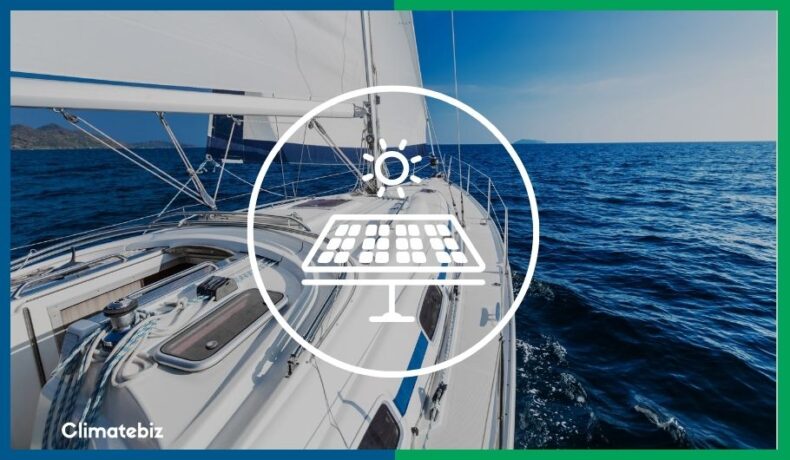Welcome to our guide on the best solar panels for boats!
Let’s take a quick guess.
We could be wrong, but chances are, you’re a proud owner of a yacht, sailboat, canoe, or any other particular kind of marine vehicle.
Then one day, you heard a story from your fellow boater about how solar panels for boats are a niche thing gaining traction.
Now, you’re probably thinking:
“What would it take if I want to slap on some solar panels on my boat, bow to stern? Charging my battery with FREE electricity does sound nice. I also wouldn’t mind powering up some appliances to enhance my boating experience.”
The only problem is, the thought of getting this done becomes overwhelming – which is perfectly understandable.
“I hope it’s not too complicated.” you might say.
Contrary to what some of you might think, selecting the best solar panels for boats isn’t that intricate. In this article, we’ll talk about the main criteria for selecting marine solar panels, then we’ll give you our top recommendations to choose from.
For reference, here are the top solar panel brands for boats that we’ve found on the market:
- Renogy
- Newpowa
- Topsolar
- Rich Solar
- Jackery
- ECOFLOW
- ECO-WORTHY
- HQST
- Sunsul
- WEIZE
- DOKIO
Alright, let’s dive in!
Table of Contents
Best Solar Panels For Boats (Editors Choice)
Now, we understand that each of you has specific needs that’ll influence which solar panel you’ll go with.
With that in mind, we took varying common use cases for marine solar panels. Of course, this is not meant to act as standard criteria, it’s simply based on our expert opinion.
By and large, you are looking at 20 watts up to 300 watts for boats meant for personal use. Of course, commercial boats can go for more.
Typical use cases:
- Gadgets and Battery Recharge – 20 to 80 watts are enough to power your small gadgets such as GPS, cellphones, and mini laptops.
2. Cold beers and warm showers – 100 to 200 watts are enough for low-power appliances such as portable refrigerators, heaters, etc. We also recommend purchasing lithium-ion batteries and inverters too.
- Boating lifestyle – Going beyond 250 watts means that you have more space to install solar panels. In this instance, we recommend ultralight flexible solar panels.
Now let’s set some expectations. Having solar panels alone isn’t enough to run a handful of appliances simultaneously. If you want to operate 400 to 2,000 watts worth of devices, you need a high-power inverter and batteries.
Nonetheless, this is a better choice for you than putting a heavy and noisy motor-based generator in your boat.
Also, marine solar panel systems do not produce excess heat, making your boat safer and cooler.
Lastly, your fuel source is FREE.
How To Choose Solar Panels For Boats?
Contrary to what some of you may think, learning how to choose solar panels for boats works about the same as designing an off-grid or RV roof solar system.
Four Basic PV System Components
Complete solar panel systems for boats include the four essential components of a photovoltaic (PV) system, namely:
- Solar panels
- Charge controllers
- Inverters
- Batteries or energy storage systems
Solar Panels
When solar panels absorb irradiance from the sun during the daytime, the solar cells convert this solar energy into electric energy. From here, the electric current generates flow into your appliances and serves as their electric source.
Limitations of Solar Panels Alone
However, there are challenges to this simple setup. That is why it’s worth your time and resources to consider other solar system components such as batteries, charge controllers, and inverters.
Batteries
One of the inherent problems with solar electricity is using it as you produce it.
Putting batteries or energy storage systems (ESS) in your system solves this problem and allows you to store solar energy for on-demand use and emergencies.
For example, batteries help you enjoy your appliances continuously. Batteries act as a backup to your solar panels when clouds suddenly block the path of the sunlight.
Of course, having an ESS in your boat’s solar panel system is optional, but if you have appliances that you’ll be using at night or want to be prepared for emergencies, we suggest you consider it in your budget.
If you’re interested in reading about our top picks for lithium-ion batteries for boats, click here.
Inverters
Inverters allow you to convert your 12-volt or 24-volt DC panel or battery output into 120 volts or 220 volts AC. Having an inverter in your marine solar system is perfect if you want to run some appliances rated at standard household voltages.
Solar Charge Controllers
Lastly, solar charge controllers are safety devices meant to prevent your batteries from overcharging or over-discharging. Charge controllers achieve this safety measure by controlling the voltage and current flow to and from your batteries.
The voltage and current regulating feature of a solar charge controller also mean that your devices and appliances connected to your batteries are protected.
There are various types of solar charge controllers in the market, but we don’t want to geek out too much. Instead, focus on the most common ones, such as the Maximum Power Point Tracking charge controller, a.k.a. MPPT, or the Pulse Width Modulation (PWM) charge controller.
The main difference between PWM and MPPT, charge control devices is that the MPPT devices are more efficient and best for large systems that can maximize their solar charging acceleration benefit, while PWM is for small-scale applications.
Solar charge controllers that use MPPT can accelerate solar charging of your battery up to 30% of the solar system output.
On the other hand, PWM charge controllers are older than MPPT controllers. They are cheaper (costing $20 to $60 compared to MPPTs playing around $100 to $729), more straightforward, and less efficient. They’re also great for reducing harmonics which can damage your sensitive electronics.
Sample Solar Panel Setup
For your convenience, here is a diagram of what a solar system looks like that contains all the components we discussed.
Now, let’s focus our attention on solar panels. What is the primary consideration for choosing your marine solar panel?
The most important feature you should look for when choosing solar panels for boats is their performance quality and ability to withstand harsh weather conditions. Therefore, you’re looking to buy solar panels from reputable companies that focus their values on performance and solar panel production quality.
Aside from that, other considerations are the weight and size of the panels since (as we’ve previously mentioned) you have limited solar panel real estate to work with on your boat.
What Are The 17 Best Solar Panels For Boats?
Choosing the best solar panels for your boat depends on your situation.
For example, we recommend that “small” boat owners purchase flexible panels while larger boats can afford standard solar panels with robust aluminum frames.
1. HQST 100 Watt Monocrystalline 12V Solar Panel
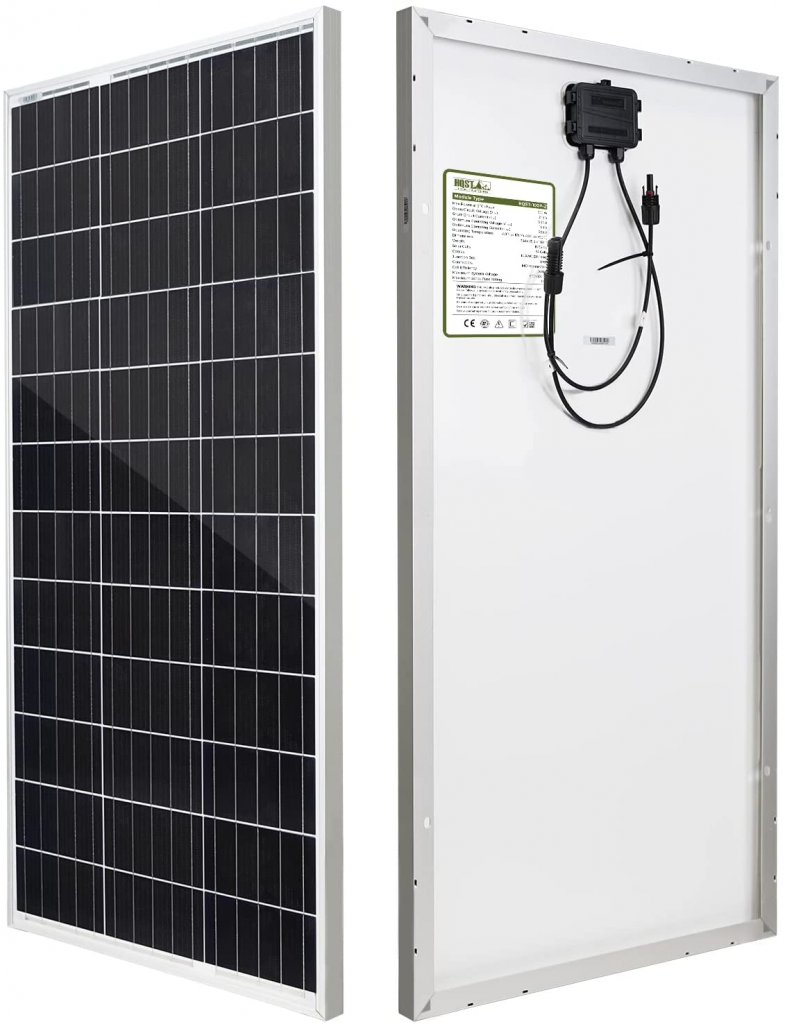
Main Features:
- Cost: $89 ($0.89 per watt)
- Compact Design
- High-Efficiency Solar Panel
- Corrosion-resistant aluminum frame for better longevity
2. Renogy Flexible Monocrystalline Marine Solar Panel
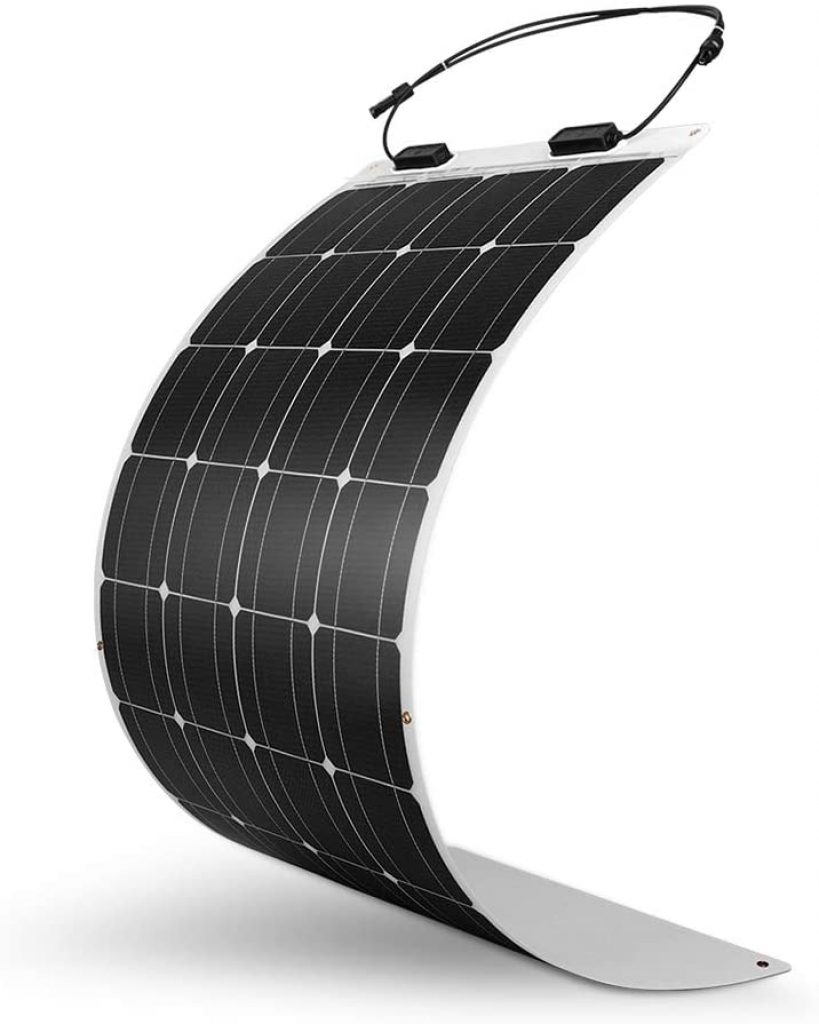
Main Features:
- Cost: $174 ($1.74 per watt)
- Weighs 70% less than conventional panels
- 0.1 inch thick. 95% thinner than traditional marine solar panels
- Robust
- This solar panel can be flexed to a maximum of 248 degrees which makes it easier to transport and install.
3. Renogy Flexible Kit with 100W Monocrystalline Panel
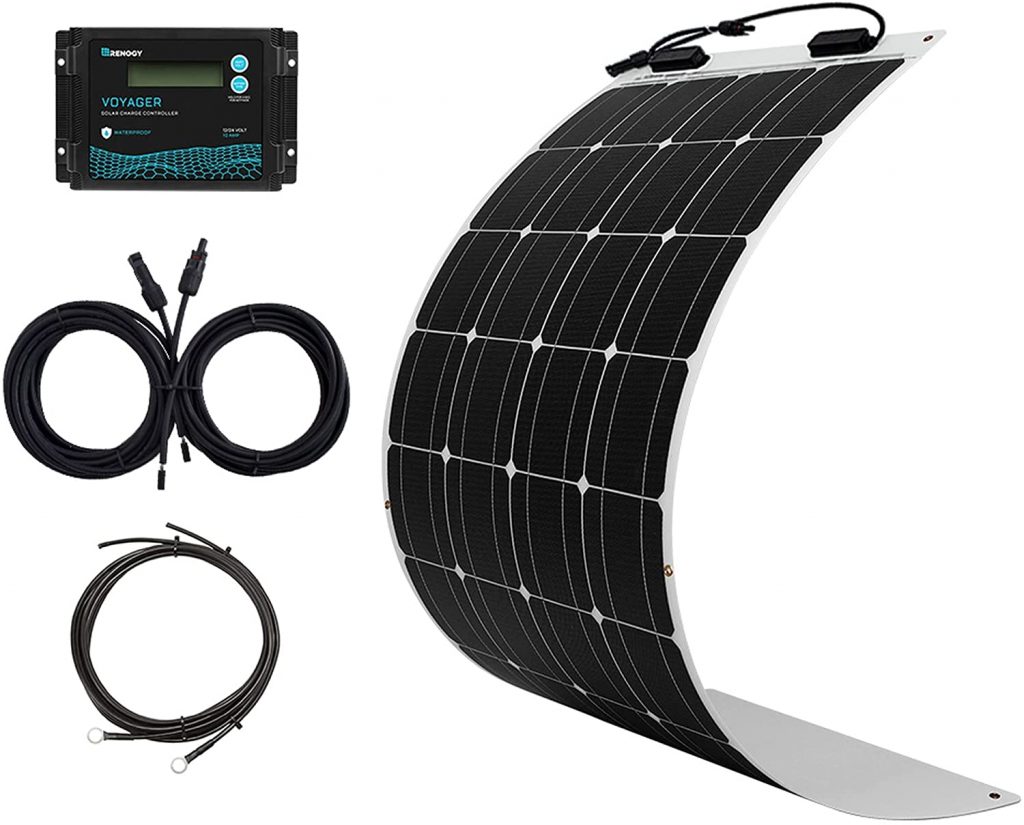
Main Features:
- Cost: $220 ($2.20 per watt)
- Weighs 70% less than conventional panels
- 0.1 inch thick. 95% thinner than traditional marine solar panels
- Robust
- This solar panel can be flexed to a maximum of 248 degrees which makes it easier to transport and install
- With waterproof charge controller
4. Renogy 100 Watt 12 Volt Off Grid Solar Premium Kit
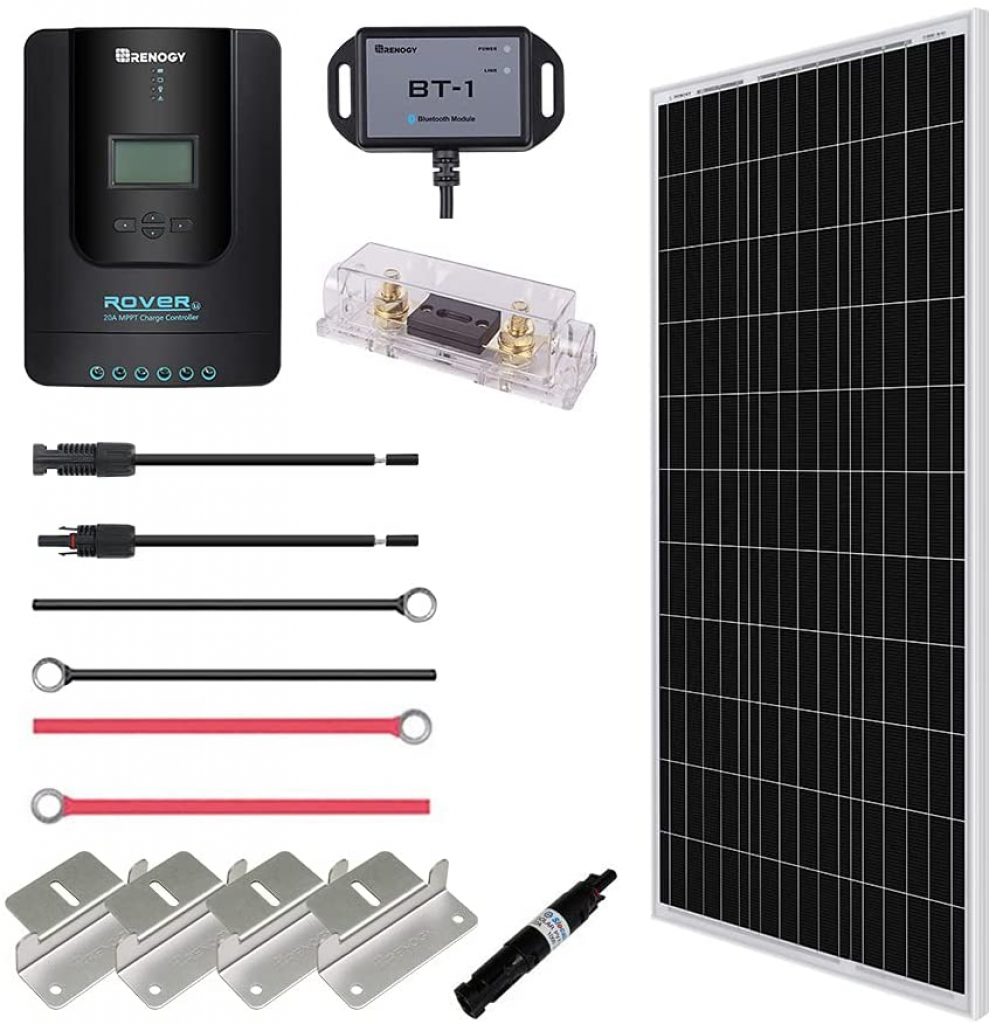
Main Features:
- Cost: $283 ($2.83 per watt)
- Premium MPPT charge controller
- Comes with a fuse
- Rapid, efficient, and safe battery charging
- Waterproof panel and cables: IP67
- IP65 rated junction box
- High-efficiency solar cells
- El tested solar modules; no hot-spot heating Corrosion-Resistant aluminum frame
5. ECO-WORTHY 25 Watts 12V Waterproof Solar Panel
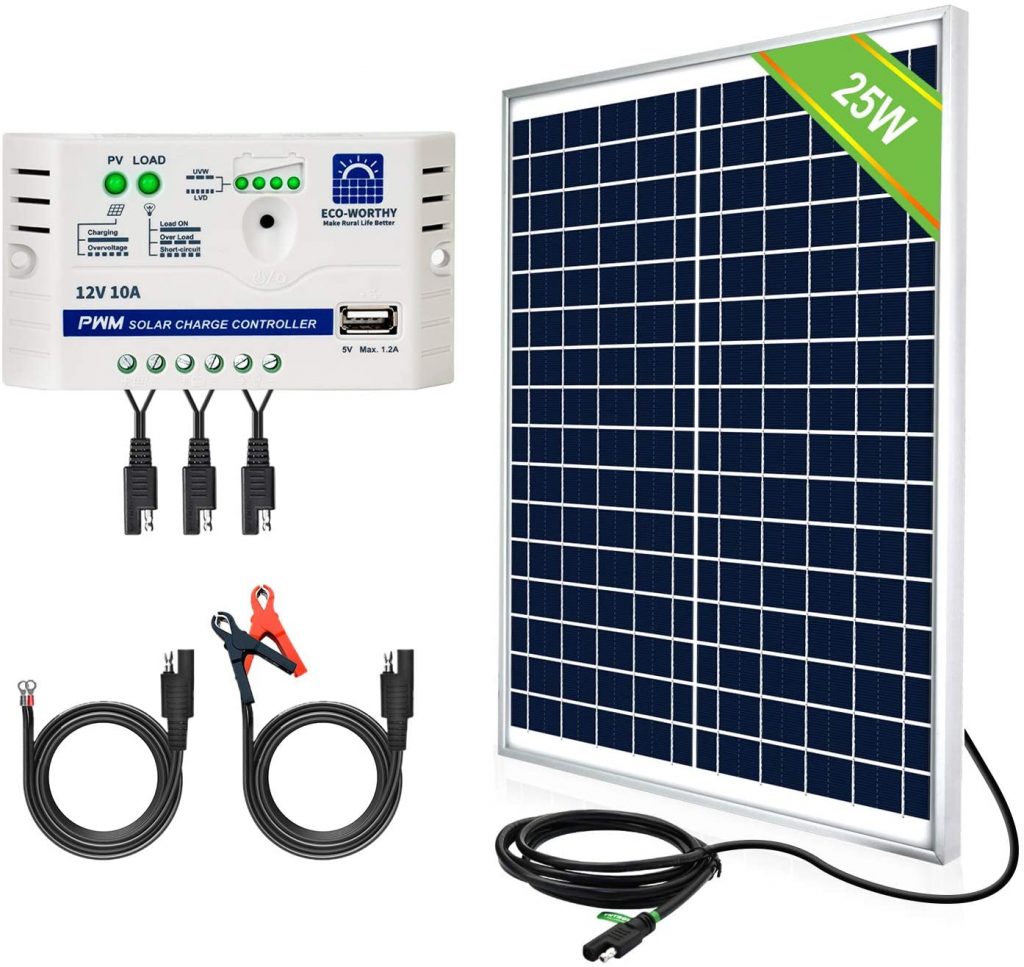
Main Features:
- Cost: $58 ($2.32 per watt)
- Easy to install
- Best for off-grid applications
6. Newpowa 30W Watts 12V Mono Solar Panel
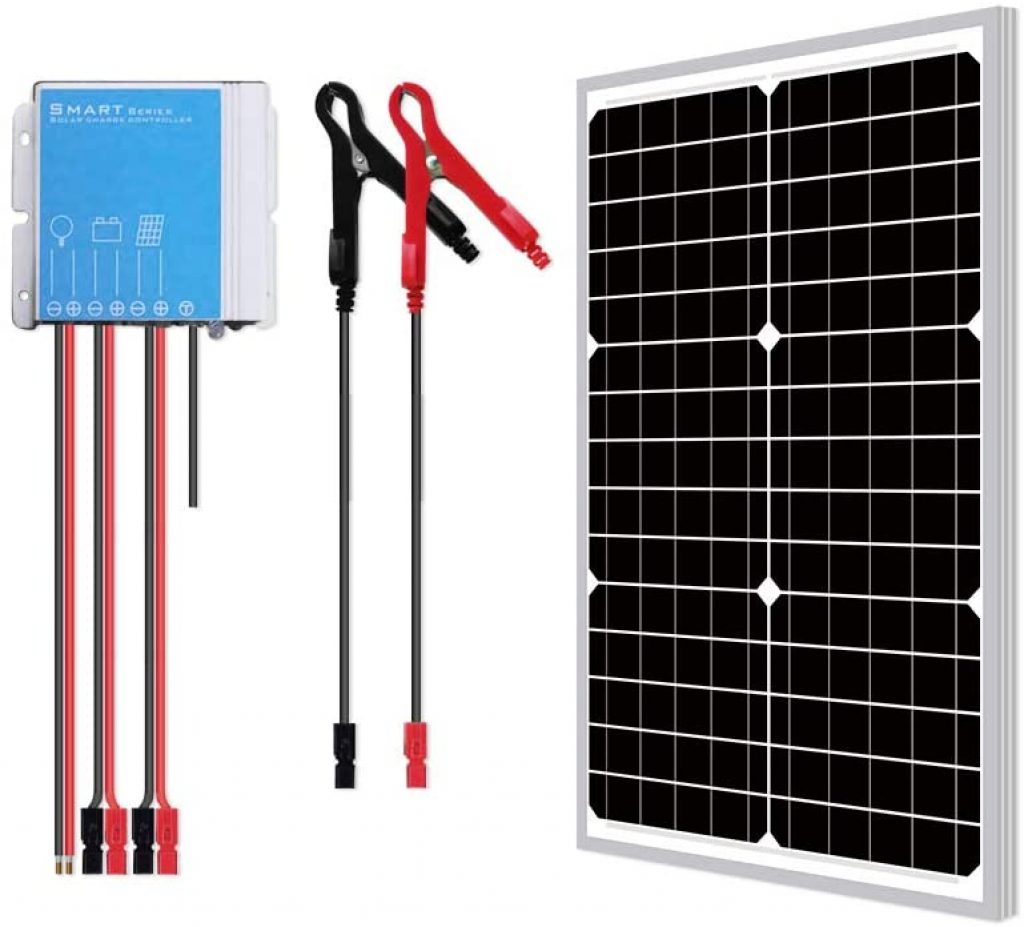
Main Features:
- Cost: $60 ($2 per watt)
- Waterproof: IP67
- Plug and Play anderson connectors
- Easy install thanks to pre-drilled mounting holes
7. Newpowa 100 Watts 12 Volts Monocrystalline Solar Panel
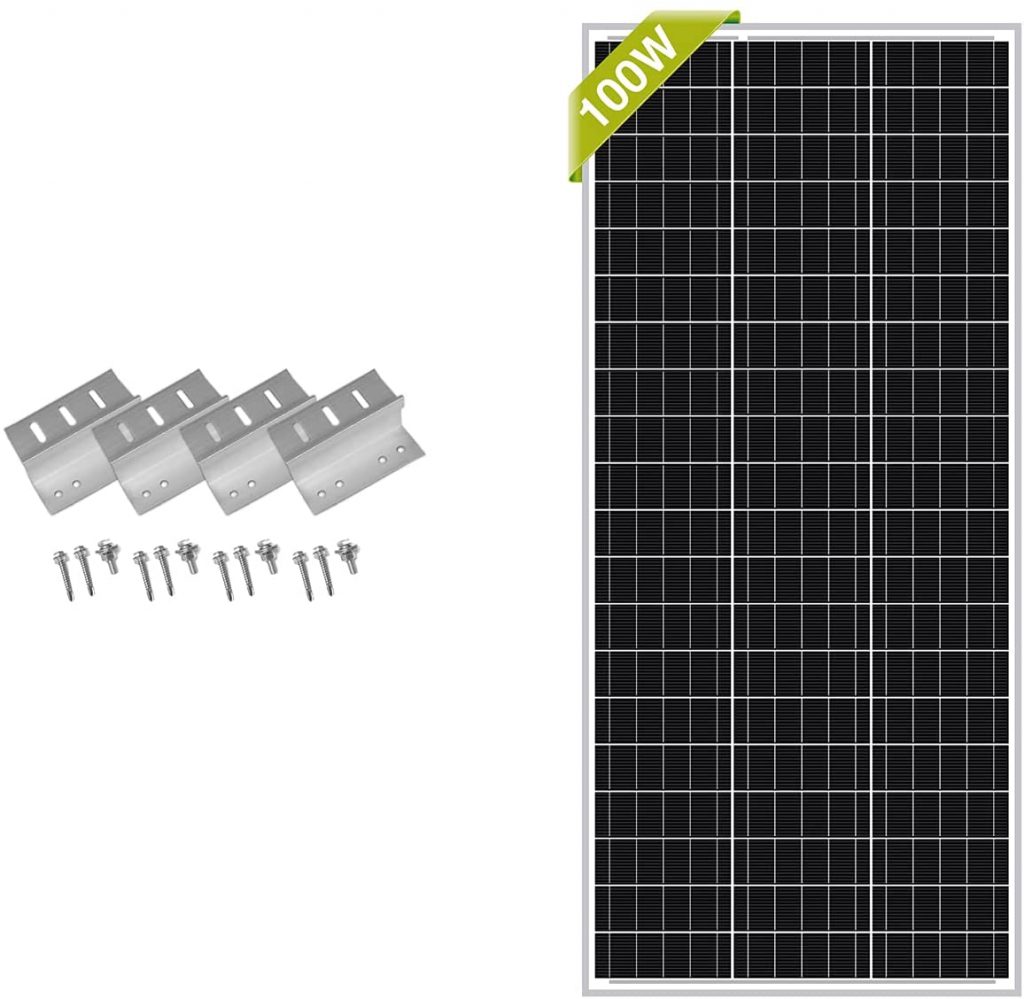
Main Features:
- Cost: $93.50 ($0.935 per watt)
- Easy install thanks to pre-drilled mounting holes
- More compact new design
- Higher efficiency solar cells
- Includes “Z” brackets and stainless steel hardware screws
8. ECO-WORTHY Complete Solar Panel Kit
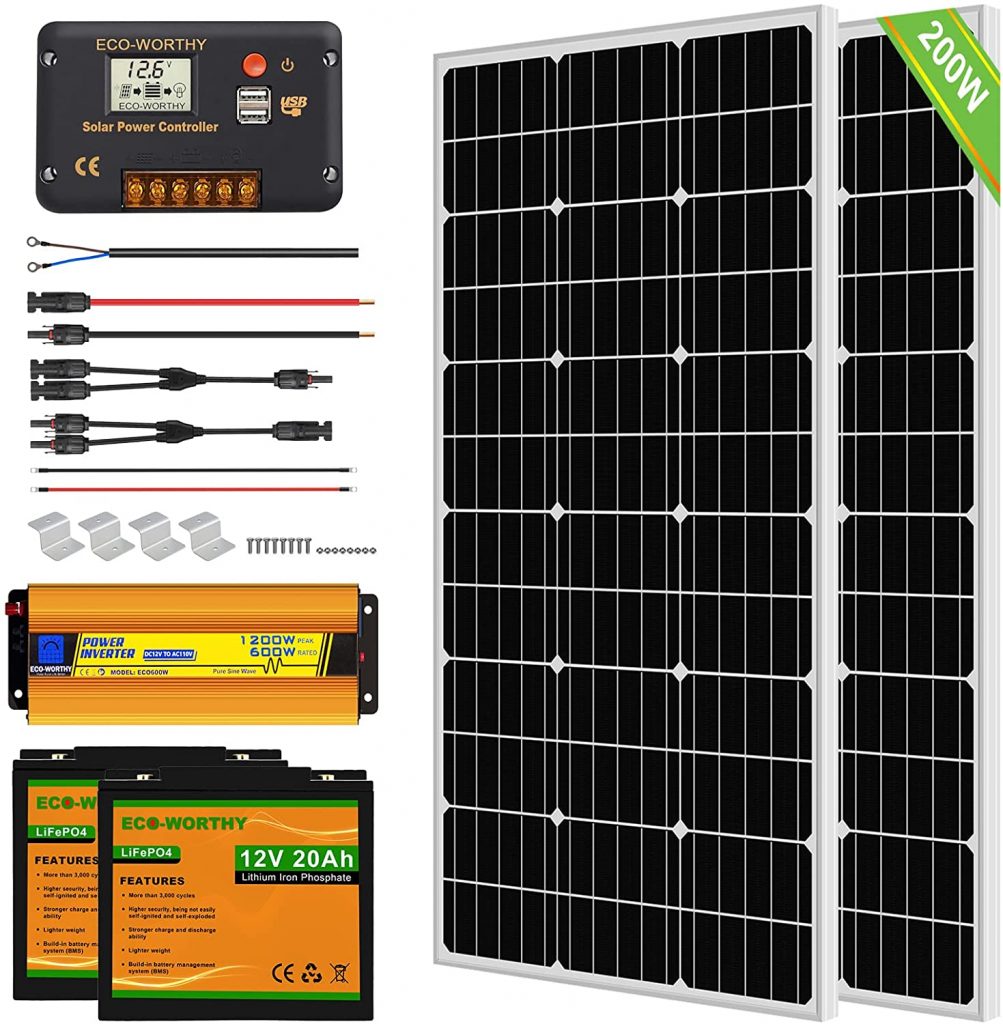
Main Features:
- Cost: $500 ($2.50 per watt)
- 21% High solar cell efficiency
- Corrosion-resistant aluminum frame for outdoor use, allowing the panels to last for decades as well as withstand high winds and snow loads
- Complete solar panel kit
- Pure sine wave inverter with LCD display
- 1 year warranty
- 24/7 technical support team
9. SUNSUL 20 Watt 12V Solar Panel Kit
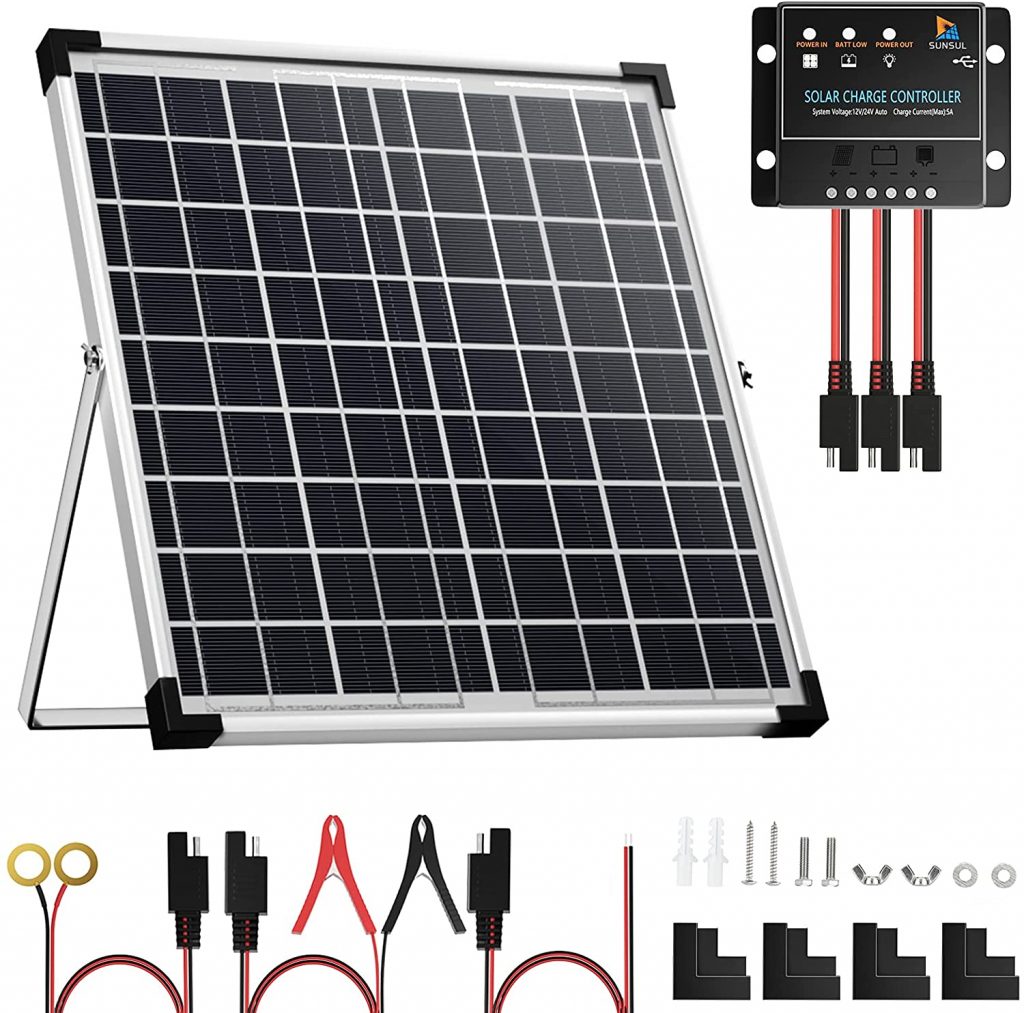
Main Features:
- Cost: $46 ($2.3 per watt)
- Solar panel comes with Waterproof 5A 12V/24V PWM Solar Charge Controller and Adjustable Solar Panels Mount Rack Bracket
- High-efficiency solar cell design
- East installation thanks to the adjustable mounting bracket
- PWM charge controller
- Company claims a perfect After-Sales Service
- High strength aluminum frame
10. Topsolar Flexible Solar Panel
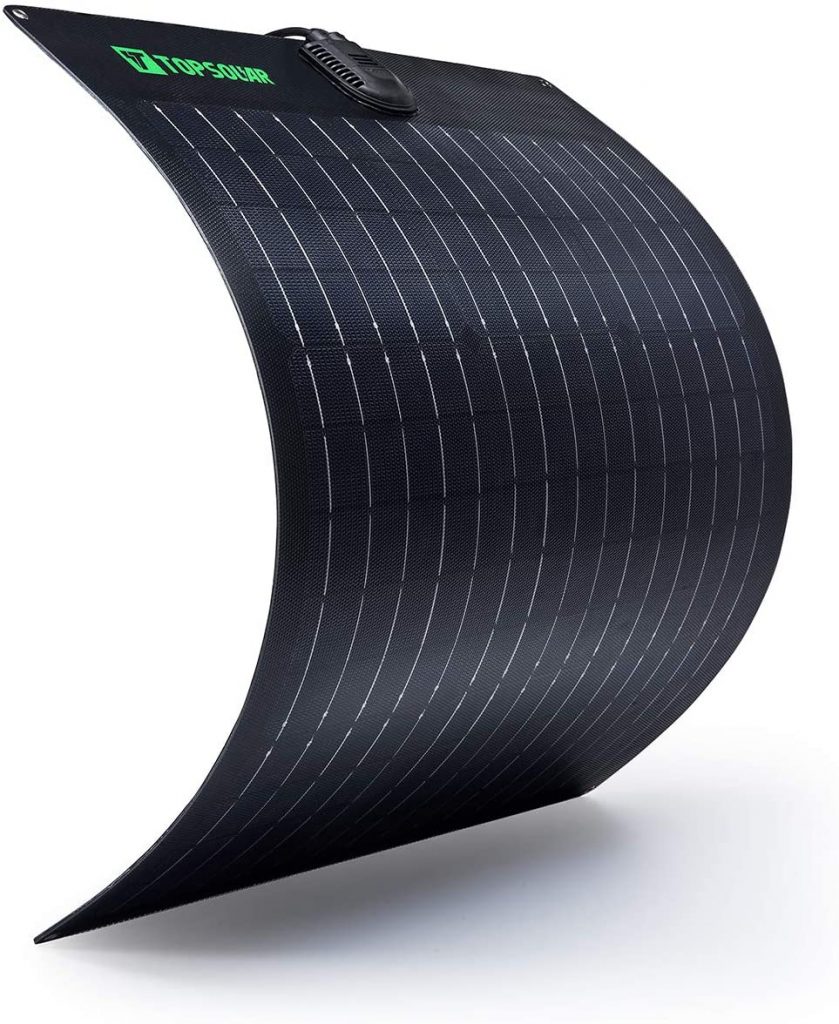
Main Features:
- Cost: $80 ($1.6 per watt)
- Perfect for irregular surfaces or curvatures
- 0.1 inch thick and weighs 4 lbs.
- Ideal for marine solar systems
- High temperature resistant and easy to clean.
- Solar panels made of advanced waterproof materials.
- Company claims it is more durable than traditional glass and aluminum model solar panels
11. RICH SOLAR 200 Watt 12 Volt Polycrystalline Solar Panel
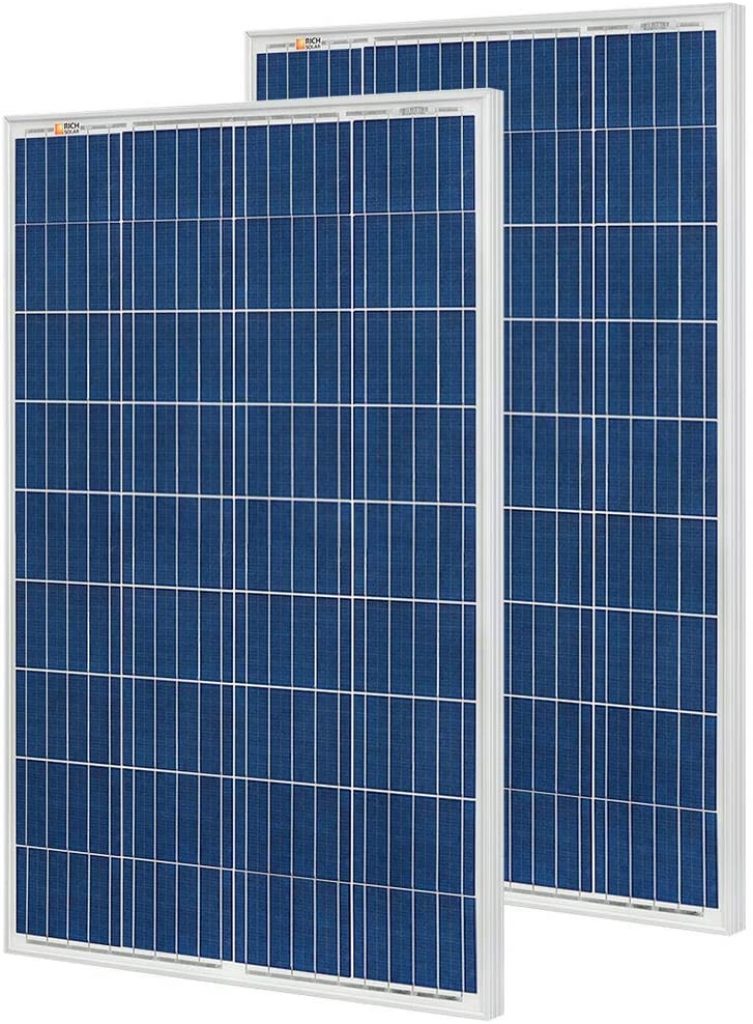
Main Features:
- Cost: $172 ($0.86 per watt)
- Standard solar panel size
- Pre-drilled mounting holes
- Excellent low light performance on cloudy days, mornings and evenings
- Certified to withstand challenging environmental conditions with tempered glass and aluminumm frames
- 25-year warranty on power output
- 5-year material and workmanship warranty
12. WEIZE 200 Watt 12 Volt Monocrystalline Solar Panel
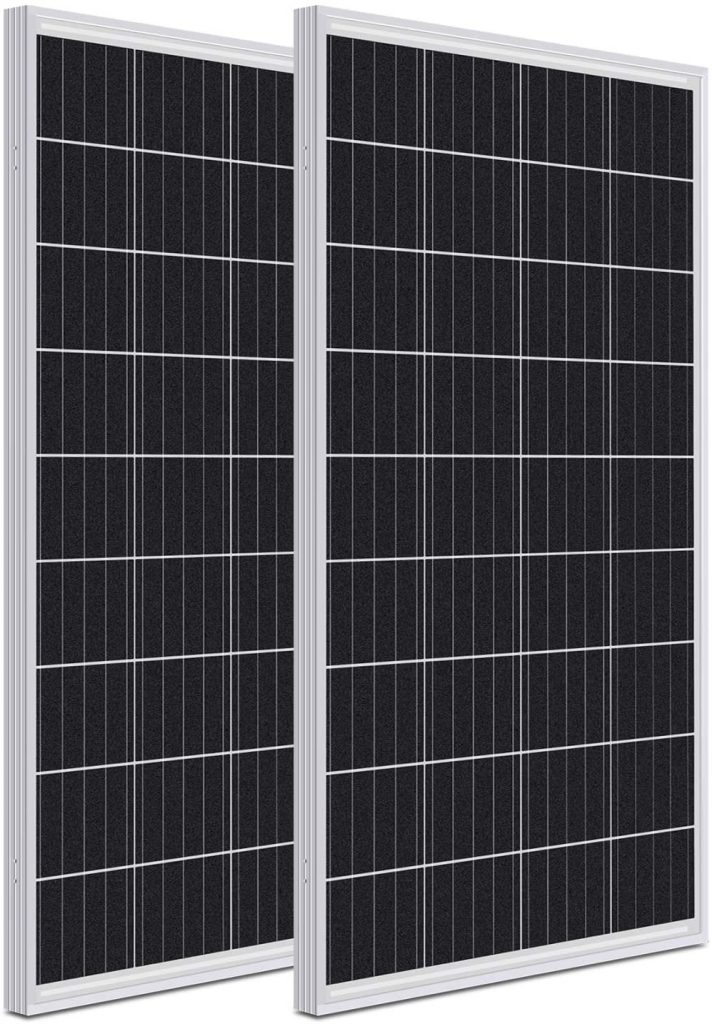
Main Features:
- Cost: $200 ($1 per watt)
- Monocrystalline solar cells have higher efficiency (up to 21%) compared to polycrystalline in bright weather condition
- Long service life and is virtually maintenance-free
- Corrosion-resistant and weatherproof thanks to high quality aluminum frames, tempered glass and sealed junction box.
- Pre-drilled holes compatible with common ground mounts, Z-brackets, side pole mounts and tilt mounts.
13. EF ECOFLOW 110W Solar Panel with Portable Power Station
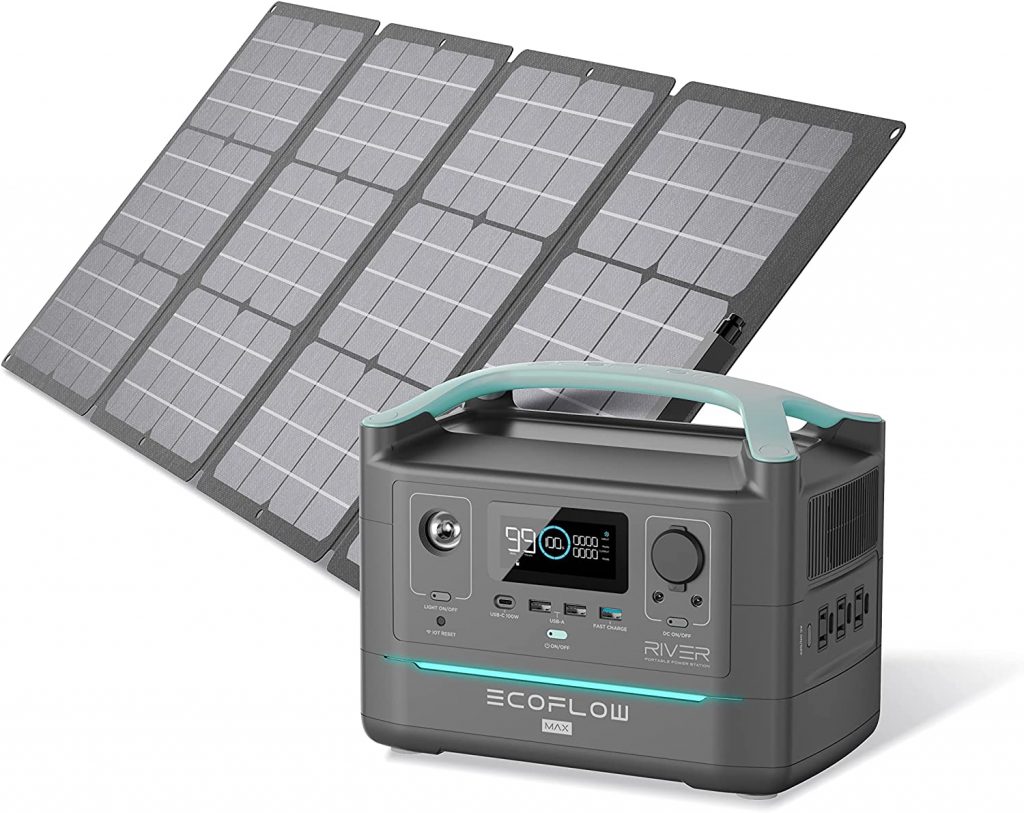
Main Features:
- Cost: $950 ($8.63 per watt)
- Portable ESS and extra battery included
- Fast-charging
- Sleek and modern look
- Solar plus storage and inverter
- Has various charging ports to power all types of devices
- Can support 1200 running watts at any moment
14. Jackery Solar Generator 1000
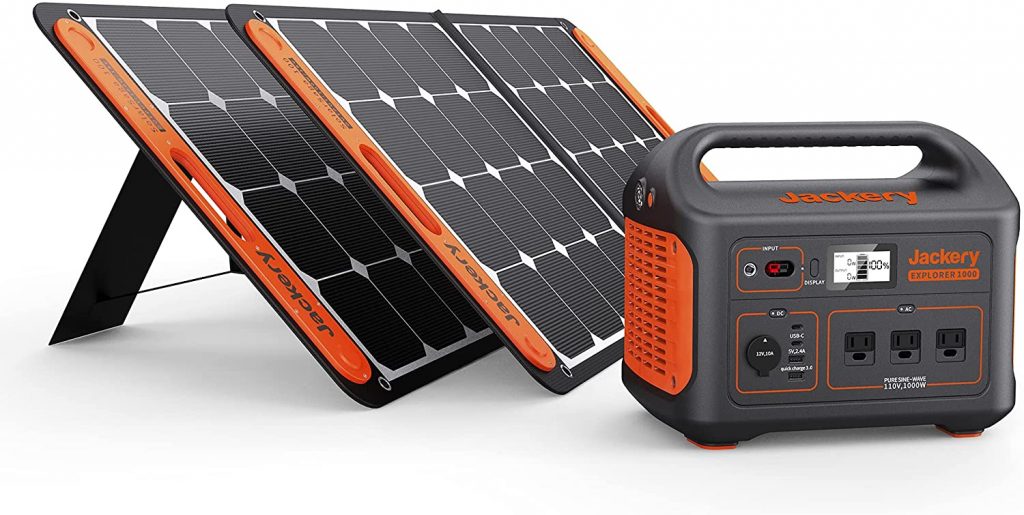
Main Features:
- Cost: $1,499 ($7.50 per watt)
- Portable ESS with 1002 Wh or 46.4 Ah capacity at 21.6V
- Fast-charging
- Sleek and modern look
- Solar plus storage and inverter
- Has various charging ports to power all types of devices
- Can support 1000 running watts at any moment
15. Jackery SolarSaga 60W Solar Panel
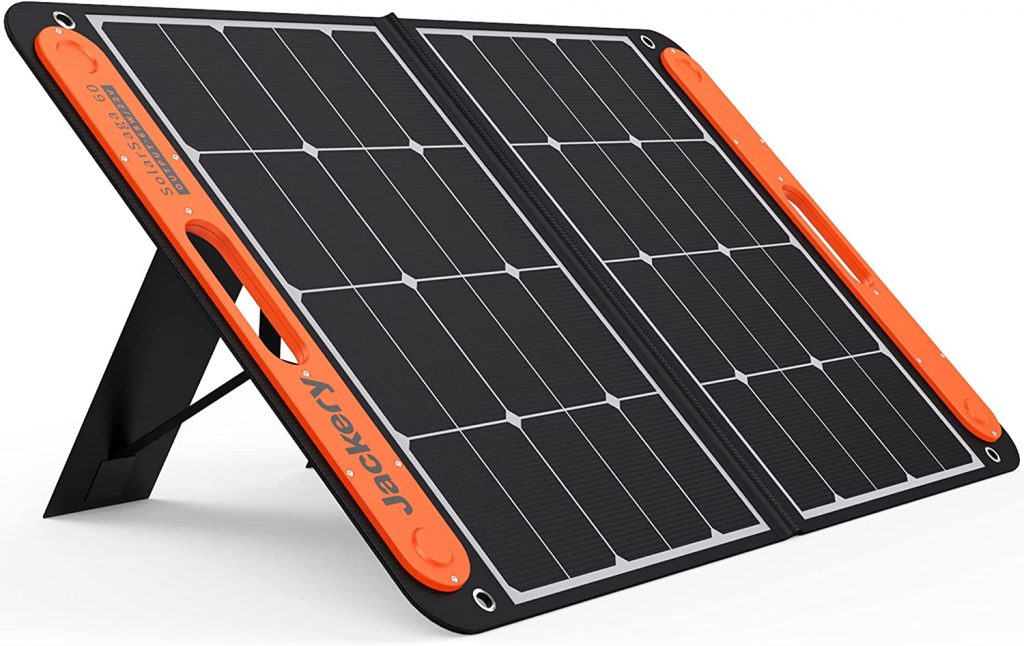
Main Features:
- Cost: $150 ($2.5 per watt)
- Weighing at only 6.6 lb, this solar panel is foldable and handy with a TPE rubber handle.
- Has a kickstand that leans on an angle ideal for solar energy absorption
16. DOKIO Foldable 100 Watt Monocrystalline Solar Panel
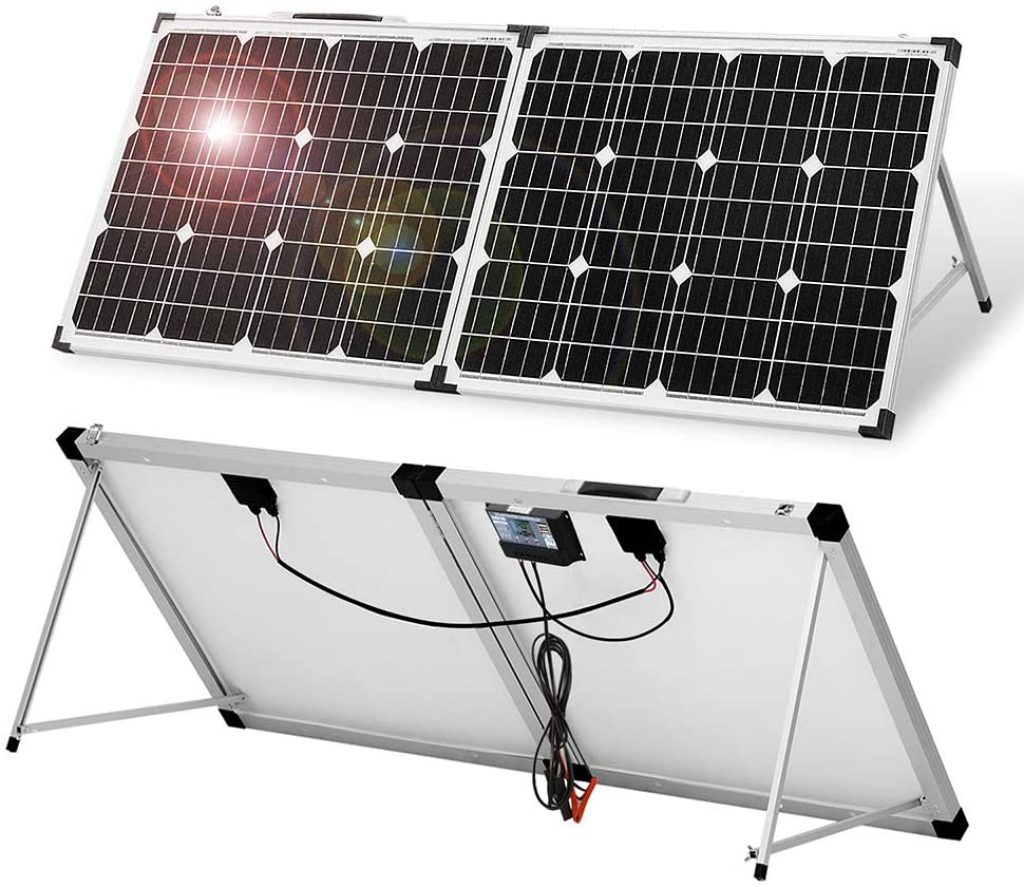
Main Features:
- Cost: $200 ($2 per watt)
- Easy operation. Unfold your solar panel then place it on the ground
- Portable with carrying bag
- Durable and corrosion-resistant
17. Foldable Renogy 100 Watt 12 Volt Monocrystalline
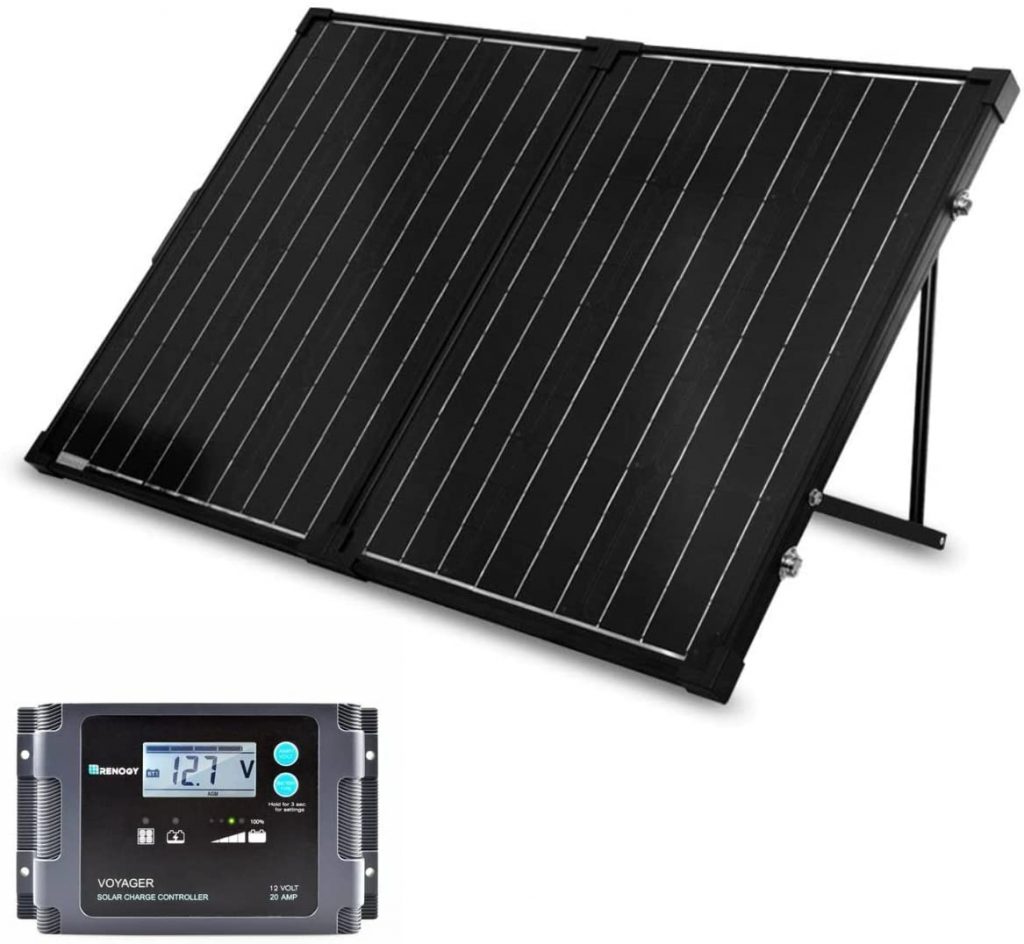
Main Features:
- Cost: $220 ($2.2 per watt)
- 21% High Solar Cell Efficiency: EL tested solar modules with bypass diodes
- High transparency tempered glass for durability and high efficiency in low solar power availability
- No hot-spot heating
- Adjustable, corrosion-resistant aluminum stand
- Durable handle and latches
- Built-in 5-stage solar charge controller charges batteries fast and safely
- Electronic device protection mechanism (overcharging, overload, short-circuit and reversed polarity)
How Long Do Solar Panels Last On Boats?
While there’s no straightforward answer to this, knowing how long your solar panels will last on a boat depends mainly on the manufacturer and the solar panel’s build quality.
That said, established solar panel developers usually brag about their warranty policies. Therefore, when reviewing your standard marine solar panels, look for 25 years warranty for the solar panel production and five years for the material itself.
Flexible and foldable panels (or adjustable panels as we would like to call them) have shorter warranties. This is because elastic panels trade their longevity in exchange for being ultralightweight, ultra-thin, and compact compared to standard panels.
In a nutshell, standard solar panels last you about 25 years, while adjustable solar panels have a typical lifespan of 5 years.
Are Solar Panels Safe On Boats?
Definitely.
If you follow proper wiring procedures and sizes, solar panels are safe on boats. Unlike fossil-fuel generators that generate heat as they produce electricity, solar systems have a negligible risk of starting fires, making solar panels safe on boats.
Are Solar Panels For Boats Worth The Money?
We get this question a lot, and our answer remains the same – solar panels are worth the money. They provide your boat with free, clean electricity. They’re a good investment for rational investors and people looking to transition to green energy.
For those who want more details, the return of your investment for solar panels is usually 2.5 to 15 years depending on the amount of solar power in your area. Read more about it in this article.
Final Thoughts
Solar panels on boats provide several benefits, mainly monetary savings from clean energy. It is a good purchase for rational investors and people who want to contribute to the green energy movement. Of course, there is a substantial lump sum that you will invest upfront. But trust us when we say that it will be worth it.

